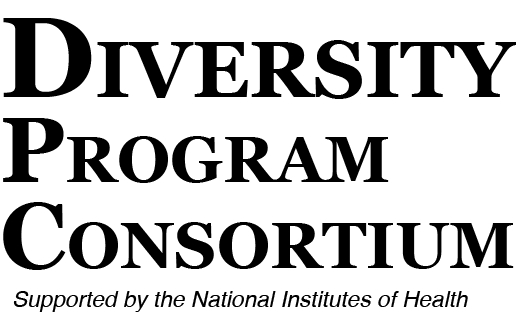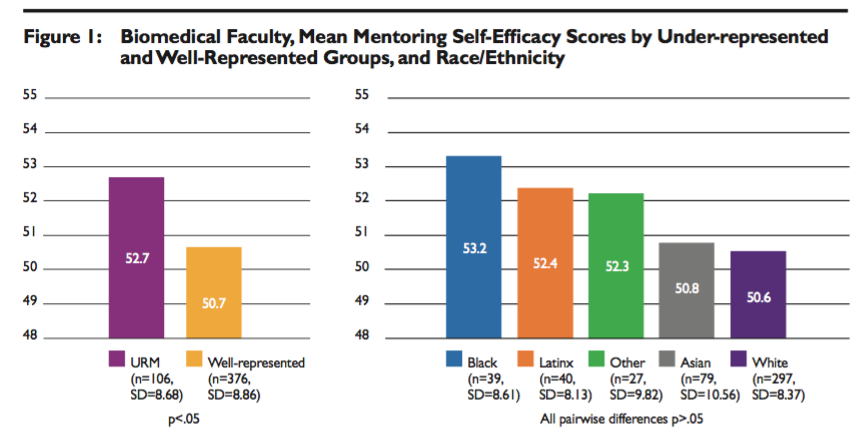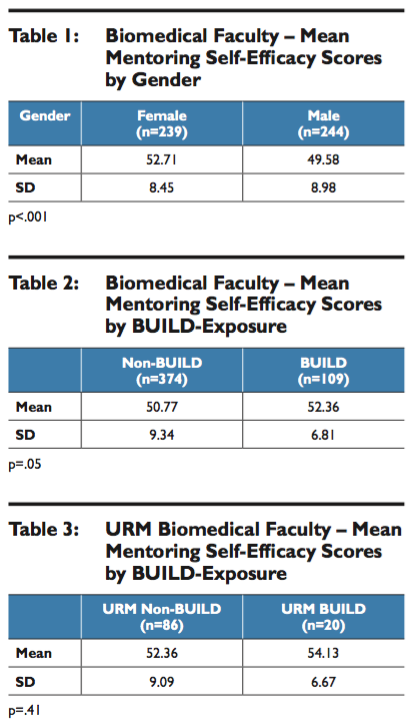



July 2019
Within the biomedical disciplines, faculty-student mentorship is a key component for success. Mentors provide support, motivation, and advice to students that increase their social capital in research, as well as their skills and identities as scientists. Increasing mentoring self-efficacy is one of the hallmarks (FAC-3) that serves as an intermediate outcome for the NIH Diversity Program Consortium (DPC).1 Data from the 2016-2017 HERI Faculty Survey2 finds that biomedical faculty respondents at the 10 BUILD sites report having higher mentoring self-efficacy scores if they are involved with the BUILD program than if they are not. This suggests that BUILD students are likely to have access to higher quality mentoring than other biomedical students.
A mentor can be defined as a wise and trusted advisor who guides the development of an individual.3 The most common form of mentorship in college involves faculty working with students. In biomedical disciplines, faculty-student mentorship provides support, motivation, and advice to help students increase their social capital in biomedical research as well as foster the development of their scientific skills and identities as scientists. Research has identified insufficient and inadequate mentoring as contributing to the underrepresentation of racial/ethnic minority and other groups of students in STEM and related biomedical majors.4 A number of successful strategies to reduce the barriers to success at key academic transition points include the use of effective mentoring.5 Institutional involvement in promoting mentorship activities in particularly important6 since effective mentorship offers positive effects not only on the learning outcomes of mentees, but on promoting students' integration into the university, which aslo increases graduation rates.7,8
Effective mentorship helps to sustain the interests of students into STEM research-related pathways and increases undergraduate academic achievement and persistence, especially for those from traditionally underrepresented groups. Additional research is needed, though, to understand how programs can improve biomedical mentors’ self-efficacy in higher education and how factors like race, ethnicity, and gender in uence mentor self-efficacy, as mentoring self-efficacy is an important measure for mentoring skills.4
Is it possible to assess skill levels through self-reported measures such as self-efficacy.4 The 2016 HERI Faculty Survey provides data for BULID faculty participants who rated their mentoring self-efficacy2,4 on a five-point scale (1=a major weakness to 5=a major strength) for each of six items:
The individual responses on each item were summed to create a single self-efficacy score which was normalized using all institutions in the HERI survey to have a mean of 50 and a standard deviation of 10. BUILD faculty in this brief are those reported by sites to have been involved in one or more of eight BUILD sponsored activities, such as mentor training or research training and support. This analysis was conducted with the 491 respondents from the 10 BUILD sites who were in biomedical elds and responded to the mentoring questions. The response survey rate was 38.6%, which is typical for surveys of this type.

Among faculty in biomedical departments at the BUILD institutions, there is variation in mentoring self-efficacy by race and ethnicity as well as by gender. As a group, and not distinguishing between BUILD and non-BUILD, URM faculty have higher self-efficacy scores than faculty from well-represented groups (White and Asian) (Figure 1).
Disaggregating URM and well-represented groups shows some potential variation among the URM groups, but the small resulting sample sizes for the URM groups does not allow us to detect any statistically significant differences (Figure 1). While all BUILD institutions are teaching intensive, two are historically black colleges that account for three-quarters of the African-American faculty, and so we may be seeing an institutional effect rather than a race effect (or an interaction of the two). Future analysis will include multilevel multivariable analysis that will be able to separate institution and individual differences more clearly.
Female faculty reported higher self-ef cacy as mentors than male faculty (Table 1). This difference was also found in the full national sample (all institutions, all disciplines) of the HERI 2016-17 faculty survey.9 There were no statistical differences in mean scores between faculty ranks, e.g. professor, associate professor, assistant professor, lecturer (data not shown).
BUILD faculty participants were assessed during the second year of the program (2016-17). Data show statistically significant differences among biomedical faculty who had participated in any BUILD activity compared with those who had not (Table 2). BUILD activities for faculty vary across institutions, and some campuses focus more on teaching and research than on mentor training which may not necessarily affect mentor efficacy. With this cross-sectional data we cannot determine if the difference is a result of BUILD recruiting mentors with higher self-efficacy, or if BUILD activities are the cause of the higher levels.


There is a similarly sized difference between BUILD and non-BUILD faculty who are from underrepresented minority (URM) groups (Table 3), although with the reduced sample size, the difference is not statistically significant.
When looking at biomedical faculty by gender and BUILD involvement, men with BUILD exposure have higher mentor self-efficacy scores than those without, while there is not a statistically significant difference for women (Table 4). The increase in self-efficacy among men in BUILD versus non-BUILD eliminates the overall difference in mentor self-efficacy between women and men among the BUILD subgroup (data not shown).
This cross-sectional data identifies variation among biomedical faculty in their mentor self-efficacy by common demographic characteristics and any involvement in the BUILD program. To the extent that the BUILD engaged faculty are also mentoring BUILD students, their higher self-efficacy suggests that they might be more effective mentors than average. This positive difference may be beneficial to the BUILD students.
Future analyses will further refine those involved with BUILD to identify those who specifically received mentor training or were otherwise involved with the program in different ways, versus those with no BUILD engagement. We will also examine longitudinal data to see if mentoring self-efficacy increases more over time for faculty involved with BUILD than others, and control for other predictors such as gender and URM-status.
Building Infrastructure Leading to Diversity (BUILD) consists of a set of 10 linked awards granted to undergraduate institutions, each of which developed approaches intended to determine the most effective ways to engage students from diverse backgrounds in biomedical research, and to prepare students to become potential future contributors to the NIH-funded research enterprise.
BUILD is one of three initiatives within the DPC. For further information see: https://www.diversityprogramconsortium.org/pages/nih
This data brief is published by the Diversity Program Consortium's (DPC) Coordination and Evaluation Center (CEC) at UCLA, 1100 Glendon Ave. Suite 850, Los Angeles, CA 90024. info@diversityprogramconsortium.org
Guerrero, Lourdes. Biomedical Faculty Mentoring Self-Efficacy at BUILD Institutions – Preliminary Results. Data Brief. Los Angeles, CA: Diversity Program Consortium (DPC) Coordination and Evaluation Center at UCLA. 2019. Publication 2019-1.
1https://www.diversityprogramconsortium.org/pages/hallmarks_yr6-10
2Higher Education Research Institute (HERI). (n.d.). Overview of Surveys. Retrieved from https://heri.ucla.edu
3Crisp, G., & Cruz, I. (2009). Mentoring college students: A critical review of the literature between 1990 and 2007. Research in Higher Education, 50(6), 525-545.
4Pfund, C., Byars-Winston, A., Branchaw, J. et al. AIDS Behav (2016) 20(Suppl 2): 238. https://doi.org/10.1007/s10461-016-1384-z
5Hurtado, S., Eagan, M. K., Cabrera, N. L., Lin, M. H., Park, J., & Lopez, M. (2008). Training Future Scientists: Predicting First-year Minority Student Participation in Health Science Research. Research in Higher Education, 49(2), 126-152.
6Estrada M, Burnett M, Campbell AG, et al. Improving Underrepresented Minority Student Persistence in STEM. CBE Life Sci Educ. 2016;15(3):es5. doi:10.1187/cbe.16-01-0038.
7Colvin, J. W., & Ashman, M. (2010). Roles, risks, and bene ts of peer mentoring relationships in higher education. Mentoring & Tutoring: Partnership in Learning, 18(2), 121-134.
8Bradbury, L. U., & Koballa Jr., T. R. (2008). Borders to cross: Identifying sources of tension in mentor-intern relationships. Teaching and Teacher Education, 24(8), 2132–2145. doi:10.1016/j.tate.2008.03.002.
9Stolzenberg, E. B., Eagan, M. K., Zimmerman, H. B., Berdan Lozano, J., Cesar-Davis, N. M., Aragon, M. C., & Rios-Aguilar, C. (2019).Undergraduate teaching faculty: The HERI Faculty Survey 2016–2017. Los Angeles: Higher Education Research Institute, UCLA.
